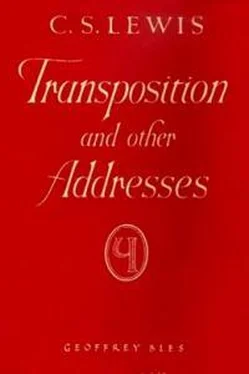Badly as I may have described it, I hope you will all have recognized the thing I am describing. Not, of course, that you have been in the Russian Army or perhaps in any army. But you have met the phenomenon of an Inner Ring. You discovered one in your house at school before the end of the first term. And when you had climbed up to somewhere near it by the end of your second year, perhaps you discovered that within the Ring there was a Ring yet more inner, which in its turn was the fringe of the great school Ring to which the house Rings were only satellites. It is even possible that the School Ring was almost in touch with a Masters' Ring. You were beginning, in fact, to pierce through the skins of the onion. And here, too, at your university—shall I be wrong in assuming that at this very moment, invisible to me, there are several rings—independent systems or concentric rings—present in this room? And I can assure you that in whatever hospital, inn of court, diocese, school, business, or college you arrive after going down, you will find the Rings—what Tolstoi calls the second or unwritten systems.
All this is rather obvious. I wonder whether you will say the same of my next step, which is this. I believe that in all men's lives at certain periods, and in many men's lives at all periods between infancy and extreme old age, one of the most dominant elements is the desire to be inside the local Ring and the terror of being left outside. This desire, in one of its forms, has indeed had ample justice done to it in literature. I mean, in the form of snobbery. Victorian fiction is full of characters who are hag–ridden by the desire to get inside that particular Ring which is, or was, called Society. But it must be clearly understood that "Society", in that sense of the word, is merely one of a hundred Rings and snobbery therefore only one form of the longing to be inside. People who believe themselves to be free, and indeed are free, from snobbery, and who read satires on snobbery with tranquil superiority, may be devoured by the desire in another form. It may be the very intensity of their desire to enter some quite different Ring which renders them immune from the allurements of high life. An invitation from a duchess would be very cold comfort to a man smarting under the sense of exclusion from some artistic or communist côterie. Poor man—it is not large, lighted rooms, or champagne, or even scandals about peers and Cabinet Ministers that he wants: it is the sacred little attic or studio, the heads bent together, the fog of tobacco smoke, and the delicious knowledge that we—we four or five all huddled beside this stove—are the people who know . Often the desire conceals itself so well that we hardly recognize the pleasures of fruition. Men tell not only their wives but themselves that it is a hardship to stay late at the office or the school on some bit of important extra work which they have been let in for because they and So–and–so and the two others are the only people left in the place who really know how things are run. But it is not quite true. It is a terrible bore, of course, when old Fatty Smithson draws you aside and whispers "Look here, we've got to get you in on this examination somehow" or "Charles and I saw at once that you've got to be on this committee". A terrible bore … ah, but how much more terrible if you were left out! It is tiring and unhealthy to lose your Saturday afternoons: but to have them free because you don't matter, that is much worse.
Freud would say, no doubt, that the whole thing is a subterfuge of the sexual impulse. I wonder whether the shoe is not sometimes on the other foot. I wonder whether, in ages of promiscuity, many a virginity has not been lost less in obedience to Venus than in obedience to the lure of the caucus. For of course, when promiscuity is the fashion, the chaste are outsiders. They are ignorant of something that other people know. They are uninitiated. And as for lighter matters, the number who first smoked or first got drunk for a similar reason is probably very large.
I must now make a distinction. I am not going to say that the existence of Inner Rings is an evil. It is certainly unavoidable. There must be confidential discussions: and it is not only not a bad thing, it is (in itself) a good thing, that personal friendship should grow up between those who work together. And it is perhaps impossible that the official hierarchy of any organization should quite coincide with its actual workings. If the wisest and most energetic people invariably held the highest posts, it might coincide; since they often do not, there must be people in high positions who are really deadweights and people in lower positions who are more important than their rank and seniority would lead you to suppose. In that way the second, unwritten system is bound to grow up. It is necessary; and perhaps it is not a necessary evil. But the desire which draws us into Inner Rings is another matter. A thing may be morally neutral and yet the desire for that thing may be dangerous. As Byron has said,
Sweet is a legacy, and passing sweet
The unexpected death of some old lady.
The painless death of a pious relative at an advanced age is not an evil. But an earnest desire for her death on the part of her heirs is not reckoned a proper feeling, and the law frowns on even the gentlest attempt to expedite her departure. Let Inner Rings be an unavoidable and even an innocent feature of life, though certainly not a beautiful one: but what of our longing to enter them, our anguish when we are excluded, and the kind of pleasure we feel when we get in?
I have no right to make assumptions about the degree to which any of you may already be compromised. I must not assume that you have ever first neglected, and finally shaken off, friends whom you really loved and who might have lasted you a lifetime, in order to court the friendship of those who appeared to you more important, more esoteric. I must not ask whether you have ever derived actual pleasure from the loneliness and humiliation of the outsiders after you yourself were in: whether you have talked to fellow members of the Ring in the presence of outsiders simply in order that the outsiders might envy; whether the means whereby, in your days of probation, you propitiated the Inner Ring, were always wholly admirable. I will ask only one question—and it is, of course, a rhetorical question which expects no answer. In the whole of your life as you now remember it, has the desire to be on the right side of that invisible line ever prompted you to any act or word on which, in the cold small hours of a wakeful night, you can look back with satisfaction? If so, your case is more fortunate than most.
But I said I was going to give advice, and advice should deal with the future, not the past. I have hinted at the past only to awake you to what I believe to be the real nature of human life. I don't believe that the economic motive and the erotic motive account for everything that goes on in what we moralists call the World. Even if you add Ambition I think the picture is still incomplete. The lust for the esoteric, the longing to be inside, take many forms which are not easily recognizable as Ambition. We hope, no doubt, for tangible profits from every Inner Ring we penetrate: power, money, liberty to break rules, avoidance of routine duties, evasion of discipline. But all these would not satisfy us if we did not get in addition the delicious sense of secret intimacy. It is no doubt a great convenience to know that we need fear no official reprimands from our official senior because he is old Percy, a fellow–member of our Ring. But we don't value the intimacy only for the sake of the convenience; quite equally we value the convenience as a proof of the intimacy.
My main purpose in this address is simply to convince you that this desire is one of the great permanent mainsprings of human action. It is one of the factors which go to make up the world as we know it—this whole pell–mell of struggle, competition, confusion, graft, disappointment and advertisement, and if it is one of the permanent mainsprings then you may be quite sure of this. Unless you take measures to prevent it, this desire is going to be one of the chief motives of your life, from the first day on which you enter your profession until the day when you are too old to care. That will be the natural thing—the life that will come to you of its own accord. Any other kind of life, if you lead it, will be the result of conscious and continuous effort. If you do nothing about it, if you drift with the stream, you will in fact be an "inner ringer". I don't say you'll be a successful one; that's as may be. But whether by pining and moping outside Rings that you can never enter, or by passing triumphantly further and further in—one way or the other you will be that kind of man.
Читать дальше











